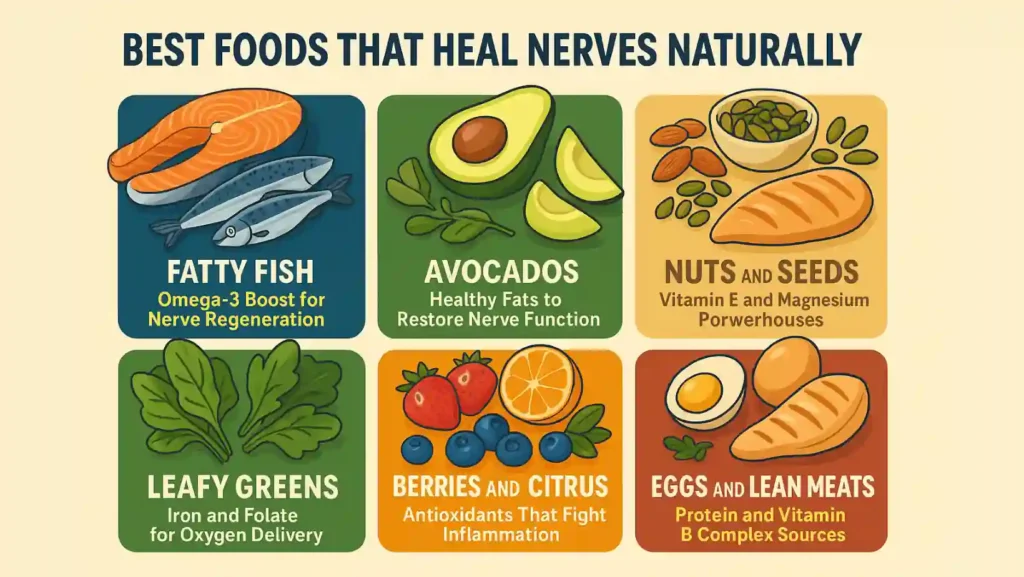You can improve nerve repair by eating the right foods. Good meals give vitamins, healthy fats, and protein that nerves need to fix myelin (the protective covering of nerves) and restore signals. A steady plan helps blood flow, lowers inflammation, and supplies building blocks for cell repair. Use these best foods for nerve repair together with medical care, rest, and movement to support recovery.
Table of Contents
ToggleHow Diet Supports Nerve Health
Role of Nutrition in Nerve Repair and Regeneration
You supply cells with fuel and parts through food. Protein gives amino acids used to rebuild cells. B vitamins help nerves make energy. Healthy fats support myelin repair. Antioxidants reduce cell damage. When you eat steadily, your body has the parts it needs to rebuild nerve tissue. A diet focused on whole foods lowers stress on nerves and improves healing conditions.
How Poor Diet Contributes to Nerve Damage
Too much sugar leads to inflammation and harms tiny blood vessels. Processed fats and trans fats damage cell membranes. Low intake of key vitamins or minerals slows repair. Long-term alcohol misuse and high blood sugar from poor choices raise the risk of nerve damage. You must cut harmful items and replace them with real foods for better nerve health.
Importance of Antioxidants and Anti-Inflammatory Foods
Antioxidants neutralize free radicals (unstable molecules that damage cells). Anti-inflammatory foods reduce swelling. Both protect nerves from ongoing harm. Berries, leafy greens, nuts, turmeric, and ginger deliver these benefits. These foods help create a safer environment for nerves to recover.
Key Nutrients for Nerve Repair
Vitamin B12 — Essential for Myelin Sheath Repair
Vitamin B12 helps make and maintain myelin. Low B12 causes numbness, weakness, and slow nerve signals. You get B12 from eggs, fish, lean meats, and fortified cereals, which are the best foods for nerve repair. If you avoid animal foods, check levels and use fortified foods or a doctor-recommended supplement.
Vitamin B1 (Thiamine) and B6 (Pyridoxine) for Nerve Signals
Thiamine helps cells make energy that nerves need. Vitamin B6 supports nerve signaling and the production of neurotransmitters (chemical messengers). Whole grains, beans, lean meats, and bananas give these vitamins. Avoid very high vitamin B6 doses without medical guidance.
Omega-3 Fatty Acids — Reduce Inflammation and Aid Healing
Omega-3s reduce inflammation and help repair cell membranes. Fatty fish such as salmon, mackerel, sardines, and trout are the best animal sources and best food for nerve repair. Flaxseeds, chia seeds, and walnuts give plant omega-3s. If you cannot eat fish, speak with your clinician about algae-based omega-3 supplements.
Magnesium — Relaxes Nerves and Prevents Cramps
Magnesium helps control nerve firing and eases muscle cramps. Nuts, seeds, whole grains, and dark leafy greens have magnesium. Low magnesium increases sensitivity and pain. A clinician can test your level and advise supplements if needed.
Vitamin E and Antioxidants for Nerve Protection
Vitamin E protects fats in cell membranes. Nuts, seeds, and certain vegetable oils provide vitamin E. Pair vitamin E foods with vitamin C fruits for better antioxidant action to protect nerve cells.
Amino Acids and Protein for Cellular Regeneration
Protein gives amino acids used to build new cells. Eat eggs, lean meats, fish, dairy, legumes, and tofu. Spread protein across meals. This steady supply helps your body rebuild nerve tissue bit by bit.
Best Foods That Heal Nerves Naturally
Fatty Fish: Omega-3 Boost for Nerve Regeneration
Fatty fish like salmon, mackerel, sardines, and trout provide omega-3s and vitamin D. These nutrients lower inflammation and help myelin repair. Aim for fatty fish two times per week. If you do not eat fish, choose flax, chia, walnuts, or an algae omega-3 source.
Leafy Greens: Iron and Folate for Oxygen Delivery
Spinach, kale, and collards give folate and iron that help blood carry oxygen. Oxygen is vital for cell repair. Add greens raw to salads, smoothies, or lightly cooked to keep nutrients intact.
Nuts and Seeds: Vitamin E and Magnesium Powerhouses
Almonds, sunflower seeds, pumpkin seeds, and walnuts provide vitamin E and magnesium. Eat a small handful daily or add them to yogurt, oatmeal, or salads for an easy nutrient boost.
Avocados: Healthy Fats to Restore Nerve Function
Avocados provide monounsaturated fats, vitamin E, and potassium. These healthy fats support cell membranes and nutrient absorption. Add avocado to toast, salads, or smoothies.
Berries and Citrus: Antioxidants That Fight Inflammation
Blueberries, strawberries, oranges, and lemons give vitamin C and polyphenols. They reduce oxidative stress and support healing. A daily serving of berries or a whole citrus fruit helps protect nerve cells.
Eggs and Lean Meats: Protein and Vitamin B Complex Sources
Eggs and lean meats provide B12 and high-quality protein. These foods support myelin production and give steady energy for healing processes. If you avoid animal foods, use fortified items, and combine plant proteins.
Plant-Based Foods for Nerve Repair
Lentils, Beans, and Peas for Nerve Nutrition
Legumes supply protein, fiber, folate, and B vitamins. They release energy slowly, which protects against blood sugar spikes that can harm nerves. Add lentils to soups and beans to salads.
Whole Grains Rich in B Vitamins and Fiber
Oats, brown rice, quinoa, and whole wheat provide B vitamins and fiber. These grains help maintain steady blood sugar and give nutrients that support nerve energy and repair.
Dark Chocolate: Natural Anti-Inflammatory Polyphenols
Small amounts of dark chocolate with high cocoa and low sugar give polyphenols that act as antioxidants. Use dark chocolate as an occasional treat to add small beneficial compounds.
Turmeric and Ginger: Natural Nerve-Soothing Herbs
Turmeric contains curcumin, which lowers inflammation. Ginger reduces pain and swelling. Add these spices to soups, stews, teas, or dressings to gently support healing.
Nerve-Repair Diet Foods to Include Daily
Breakfast: Smoothie With Spinach, Flaxseeds, and Yogurt
Blend spinach, banana, flaxseeds, and plain yogurt for B vitamins, omega-3s, and protein. This is a quick way to give your nerves steady fuel at the start of the day.
Lunch: Salmon With Quinoa and Steamed Broccoli
A lunch of salmon, quinoa, and broccoli gives omega-3s, protein, fiber, vitamin C, and B vitamins. This nerve-repair diet food is a balanced meal that helps nerves and keeps your blood sugar steady.
Dinner: Lentil Curry With Leafy Greens and Turmeric
A lentil curry with spinach and turmeric offers plant protein, folate, and anti-inflammatory spice. Serve with brown rice for whole-grain energy.
Snacks: Handful of Almonds or Walnuts for Healthy Fats
A small handful of nuts plus a piece of fruit provides vitamin E, magnesium, and a little protein. These nerve-repair diet foods help keep you steady between meals and support repair.
Foods That Damage Nerves (To Limit or Avoid)
Processed Foods High in Sugar and Trans Fats
Candy, pastries, sweet drinks, and fried snacks raise blood sugar and cause inflammation. These foods increase nerve stress and slow healing. Replace them with whole fruits, nuts, and whole grains.
Excessive Alcohol and Caffeine Intake
Alcohol damages nerve fibers and can block repair. Too much caffeine can harm sleep and raise anxiety. Both can slow nerve recovery. Keep alcohol low and caffeine moderate.
Refined Carbohydrates That Spike Blood Sugar
White bread, sugary cereals, and pastries cause blood sugar spikes. Spikes increase nerve stress. Choose whole-grain versions and fiber-rich foods instead.
Artificial Additives and MSG
Some packaged foods contain additives that can raise inflammation in sensitive people. Cook fresh when possible and read labels to avoid unnecessary additives.
Nerve Repair Nutrition Tips
Eat Anti-Inflammatory Foods Daily
Make berries, leafy greens, nuts, fatty fish, turmeric, and ginger regular parts of your meals. These foods lower swelling and protect nerve tissue.
Stay Hydrated to Improve Blood Flow
Drink water throughout the day. Proper hydration helps blood carry oxygen and nutrients to areas that need repair.
Combine Diet With Gentle Exercise and Rest
Move daily with light exercise like walking, swimming, or gentle yoga. Movement improves circulation. Rest enough for cells to rebuild.
Consult a Doctor Before Using Supplements
Get tests to check for nutrient gaps. A clinician can recommend safe supplements, the correct dose, and check for interactions with medicines.
Diet for Nerve Health and Repair: Sample Plan
3-Day Nerve-Repair Meal Plan Overview
- Day 1: Spinach smoothie, salmon salad, lentil dinner, nuts and berries snacks.
- Day 2: Oatmeal with seeds, turkey or tofu lunch, brown rice with greens dinner, fruit snacks.
- Day 3: Eggs or beans for breakfast, quinoa bowl with avocado, fish or tempeh dinner, yogurt with fruit snacks.
Key Nutrients to Prioritize at Each Meal
- Breakfast: B vitamins, protein, healthy fat.
- Lunch: Omega-3s, veggies, lean protein.
- Dinner: Whole grains, plant or lean protein, antioxidant-rich side.
- Snacks: Nuts, berries, yogurt for steady nutrients.
Balancing Macronutrients for Nerve Function
Each meal should include protein, healthy fat, and complex carbohydrates. This balance keeps blood sugar steady and supplies building blocks for repair.
Lifestyle Habits That Support Nerve Healing
Manage Stress to Reduce Nerve Inflammation
Long-term stress raises inflammation. Use short breathing breaks, walk outside, and rest. Lower stress helps tissues rebuild more effectively.
Prioritize Sleep for Cell Regeneration
Sleep is when the body repairs cells. Set a calm bedtime routine and try to keep regular sleep hours to give nerves time to recover.
Gentle Movement Like Yoga or Swimming
Low-impact exercise improves circulation and oxygen delivery. Choose movements that feel safe and do not raise pain or strain.
FAQs
Can damaged nerves heal naturally through diet?
You can help nerves recover with a nutrient-rich diet, rest, and medical care. Diet supports repair, but full recovery depends on the damage, blood flow, and medical treatment.
Which vitamins are essential for nerve repair?
Key vitamins and best foods for nerve repair include B12, B1, B6, vitamin E, vitamin C, and minerals like magnesium. Eat foods that supply these regularly for steady repair.
What foods should I avoid for nerve health?
Avoid sugary drinks, fried snacks, processed items high in trans fats, and heavy alcohol use. These increase inflammation and slow nerve recovery over time.
How do omega-3s help with nerve healing?
Omega-3s lower inflammation, support cell membranes, help form healthy myelin, and improve blood flow. Eat fatty fish or plant options to supply them regularly.
Is a vegetarian diet good for nerve repair?
Yes, a vegetarian diet can support nerve repair with careful planning. Ensure B12 from fortified foods or supplements and get enough protein from legumes and nuts.
How long does it take for nerves to regenerate?
Nerve healing varies. Small fibers may heal in weeks, major nerves can take months or years. Healing speed depends on injury, age, blood flow, and care.
Can supplements speed up nerve repair?
Supplements help when you have real deficiencies. They do not replace food or medical care. Test first and follow the clinician’s advice for safe use.
Are there natural remedies for nerve pain?
Some natural remedies like turmeric, ginger, magnesium-rich foods, and omega-3s can ease pain and are the best foods for nerve repair. Use them with medical advice and don’t drop prescribed treatments.
What’s a sample daily nerve-repair diet plan?
A sample day: spinach-flax smoothie for breakfast, salmon and quinoa lunch, lentil or bean dinner with greens, snacks of nuts and berries for steady nutrients.
Do antioxidants really help nerve healing?
Yes. Antioxidants reduce cell damage from free radicals and support repair. Eat berries, leafy greens, nuts, and citrus to add antioxidant protection each day.
Can diabetes-related nerve damage improve with diet?
Diet helps diabetic nerve damage by controlling blood sugar and adding protective nutrients. Pair diet with glucose control, foot care, and medical treatment for the best results.
How can I tell if my nerves are healing?
You may see less tingling, better strength, improved balance, and less pain. Healing is gradual, so track changes and consult your clinician for testing.
Should I see a doctor before changing my diet?
Yes. See a clinician if you have diabetes, complex health issues, or take medicines. A doctor can test for deficiencies and guide safe, effective changes.
About The Author

This article is medically reviewed by Dr. Chandril Chugh, Board-Certified Neurologist, providing expert insights and reliable health information.
Dr. Chandril Chugh is a U.S.-trained neurologist with over a decade of experience. Known for his compassionate care, he specializes in treating neurological conditions such as migraines, epilepsy, and Parkinson’s disease. Dr. Chugh is highly regarded for his patient-centered approach and dedication to providing personalized care.
→ Book a consultation to discover which remedies suit your needs best.





